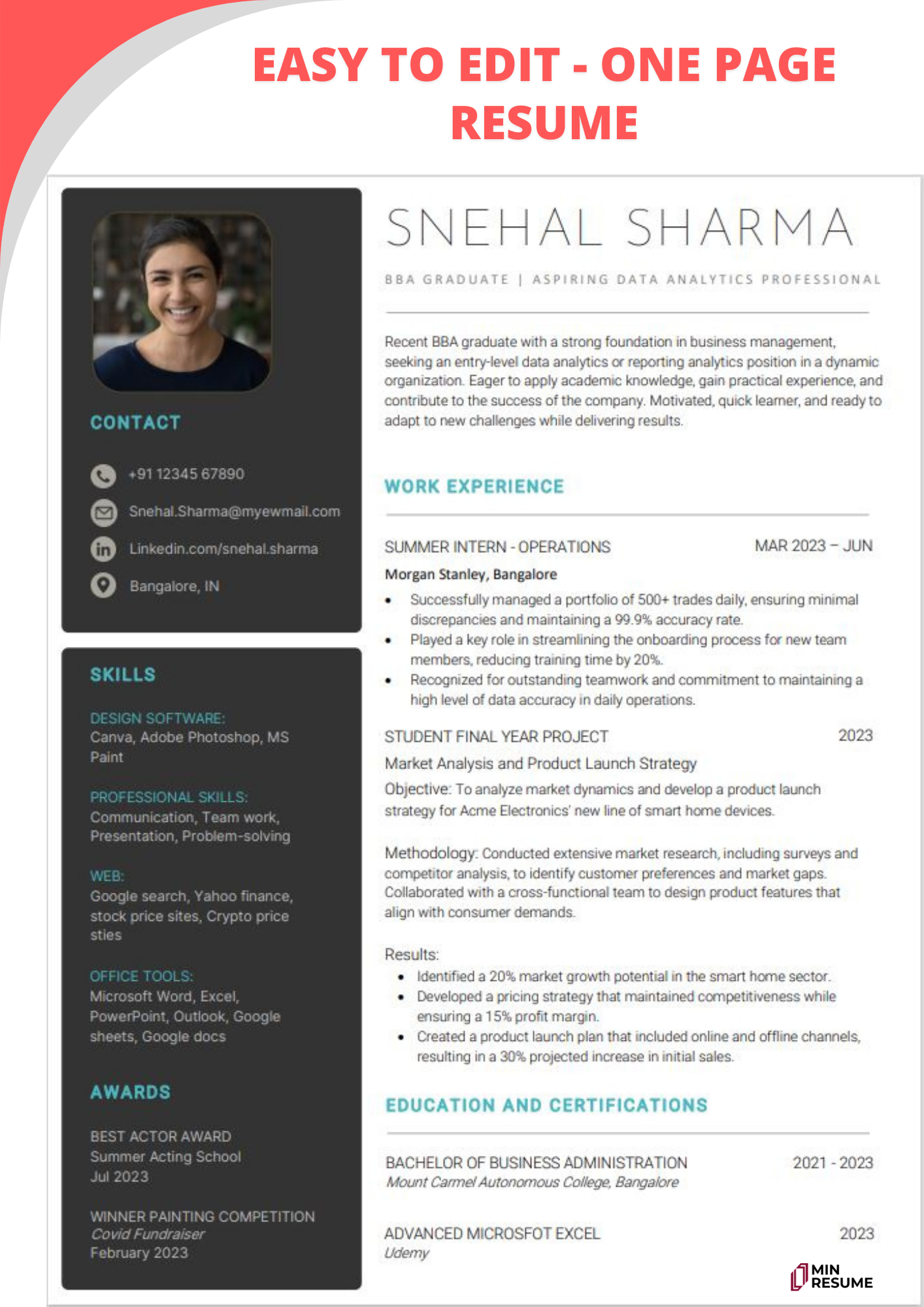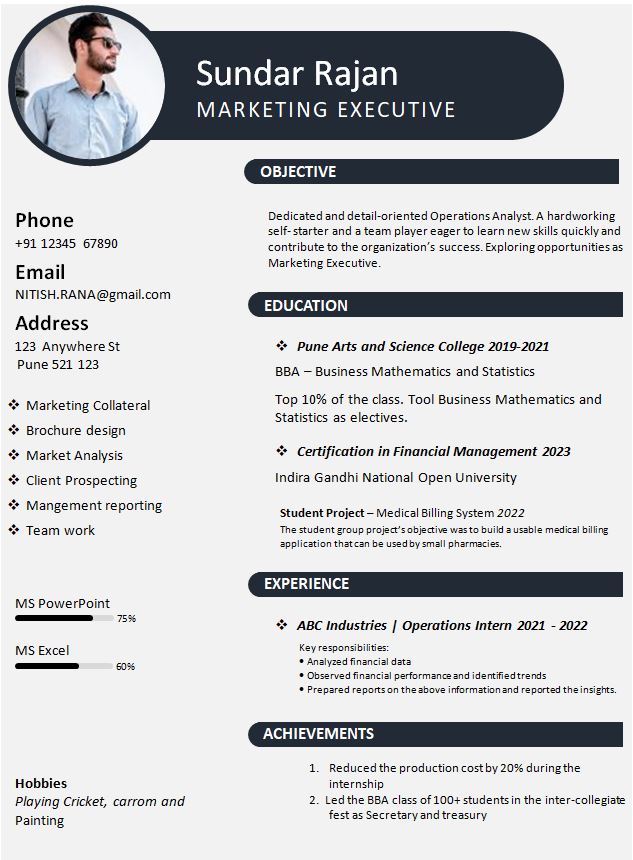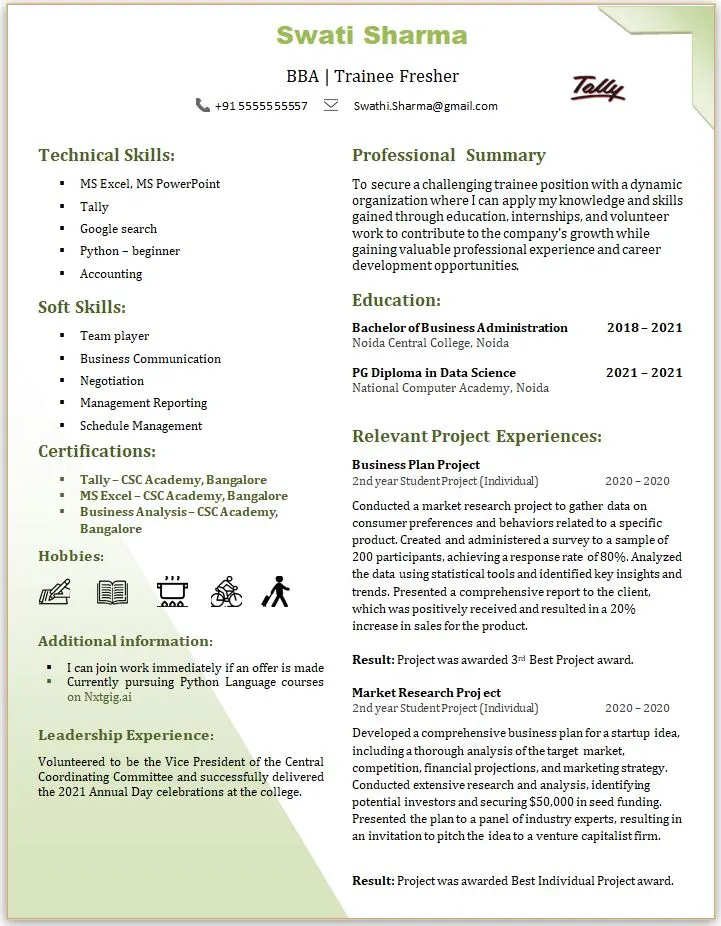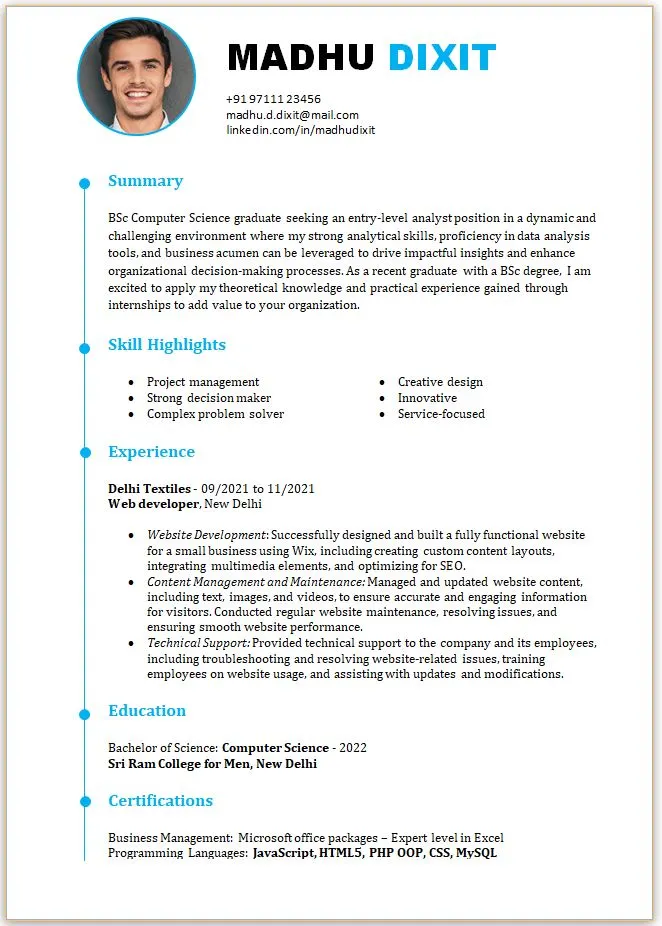Modern Resume
Data Analytics Fresher Resume
BBA fresher resume template
dataa


Objective
The sample we have written in the template will work for most graduate degrees; however, here is an alternative career objective statement if you want a slightly longer version.
"Enthusiastic BBA graduate with a solid background in business management, actively pursuing opportunities in entry-level data analytics or reporting analytics roles within a dynamic organizational setting. Keen to translate academic insights into practical contributions, I am eager to embark on a journey of continuous learning, adaptability, and impactful results. Motivated, quick to learn, and ready to embrace new challenges, I am committed to contributing to the success and growth of the company"
Education
Bachelor of Business Administration, Bachelor of Computer Applications, Bachelor of Engineering, Bachelor of Technology, Bachelor of Science
Skills
If you are a recent college graduate struggling to find your first job in the technical functions without much luck and about to start blaming you for not pursuing a technical stream of education, don't be. Nothing is farther than truth.
The technical functions across industries care for what skills candidates possess rather than what degrees they hold. We want to help you with understanding the top 5 most important skills and how you can go about acquiring them and building confidence in applying them.
1. Technical Proficiency: Start with foundational technical skills. Depending on your area of interest, this could include learning programming languages (e.g., Python), data analysis tools (e.g., Excel, SQL), or other relevant software. Online courses, tutorials, and hands-on projects are excellent resources. Break down your learning into manageable tasks. Celebrate small victories, and don't be afraid to ask for help or collaborate with others. Consistent practice and application will boost your confidence over time.
2. Data Analysis and Interpretation: Understand statistical concepts and data analysis techniques. Work on projects that involve collecting, cleaning, and interpreting data. Practice drawing insights from data sets and presenting your findings. Start with simple analyses and gradually tackle more complex tasks. Share your findings with peers or mentors for feedback. Confidence grows as you see the practical applications of your analytical skills.
3. Problem-Solving: Cultivate your problem-solving skills by working on real-world scenarios. Practice breaking down complex problems into smaller, more manageable components. Explore different approaches and solutions. Embrace a growth mindset. Recognize that problem-solving is a skill that can be developed over time. Each challenge you overcome contributes to your confidence. Reflect on your progress regularly.
4. Communication Skills: Practice conveying technical concepts in a clear and concise manner. Work on your ability to communicate findings to both technical and non-technical stakeholders. Develop skills in data visualization and storytelling. Start by explaining concepts to yourself or a friend. Engage in discussions on forums or social media related to your field of interest. Present your projects to a small audience, and gradually expand to larger audiences.
5. Continuous Learning and Adaptability: This is a very cliched but often undervalued quality among those looking to build a new skill, especially a technical skill. Stay updated on industry trends, tools, and techniques. Actively seek out new information and be open to learning from experiences. Embrace a mindset of continuous improvement.
While it all looks easy, learning is rewarding only when it has a purpose behind it. Do not try to learn analytics and business intelligence for the sake of learning; instead, have fun learning by applying your learning on small pet projects. Also, understand that the learning process is ongoing and that everyone, even experienced professionals, is continuously learning. Set realistic learning goals, and acknowledge that adapting to new information is a sign of growth. An example of a realistic goal is "I will build a small Tableau dashboard with Covid data from kaggle in the before the next weekend". An example of an aspirational but non realistic goal is "I will spend 3 hours learning tableau everyday in the morning when I wake up".
Good luck learning your new skills!
Projects
The student project we have shown in the resume if a great example of how to describe the project you have worked on while you were in college. If you are still in college, here are some projects to consider working on as your final year project especially if you have interest in the Data, Business Analytics and Business Intelligence functions across industries.
1. Sales Performance Analysis:
Objective:
Analyze sales data to identify trends, patterns, and insights that can contribute to improved sales strategies.
Tasks:
- Import and clean sales data.
- Perform exploratory data analysis (EDA) to identify correlations between sales and various factors.
- Create visualizations to present key findings.
- Develop recommendations for optimizing sales performance.
2. Customer Segmentation for Marketing:
Objective:
Segment customers based on their behavior, demographics, and purchasing patterns to tailor marketing strategies.
Tasks:
- Collect and clean customer data.
- Apply clustering algorithms to identify distinct customer segments.
- Analyze each segment's characteristics and preferences.
- Propose personalized marketing strategies for each segment.
3. Financial Forecasting for Budgeting:
Objective:
Use historical financial data to forecast future financial performance, aiding in budgeting and decision-making.
Tasks:
- Gather and preprocess financial data.
- Apply time-series analysis or regression models for forecasting.
- Validate and fine-tune the model.
- Present insights and predictions to support budget planning.
4. Employee Performance Analysis:
Objective:
Evaluate employee performance metrics to identify factors influencing productivity and job satisfaction.
Tasks:
- Collect and clean HR data, including performance reviews, attendance, and satisfaction surveys.
- Conduct statistical analysis to identify correlations between variables.
- Create visualizations to communicate insights.
- Develop recommendations for improving employee performance and satisfaction.
5. Supply Chain Optimization:
Objective:
Optimize the supply chain by analyzing data related to inventory, demand, and logistics.
Tasks:
- Collect and clean supply chain data.
- Use forecasting models to predict demand and optimize inventory levels.
- Analyze logistical data to identify bottlenecks and inefficiencies.
- Propose strategies for improving supply chain efficiency.
Additional Inputs
If you recently graduated, Congratulations on your graduation! If you graduated with a non technical degree, terms like Data Analytics and Business Intelligence can all sound exciting and confusing at the same time. Nevertheless, if you have some idea of what these functions are and you are considering starting your career in these functions, you might find our ten-step approach easy to understand the steps involved in making such a move.
1. Understand the Basics:
Begin with the basics of data analytics. Familiarize yourself with key concepts, terminology, and common tools used in the field. Acquire proficiency in essential data analytics tools such as Excel, SQL, and Python. These are widely used in the industry and will form the foundation of your technical skills.
2. Enroll in Online Courses:
Explore online learning platforms like Coursera, edX, or LinkedIn Learning. Courses in data analytics, statistics, and machine learning can provide a structured learning path.
3. Build a Strong Educational Foundation:
Consider pursuing certifications or additional degrees in data analytics. This will not only enhance your knowledge but also make your resume stand out to potential employers. MIT edX is a great resource.
4. Pursue Hands-On Projects:
Apply your learning by working on real-world projects. Create a portfolio showcasing these projects to demonstrate your practical skills to potential employers.
5. Networking:
Attend industry events, workshops, and meetups. Networking is crucial for building connections with professionals in the field. Platforms like LinkedIn can be valuable for connecting with people and staying updated on industry trends.
6. Read Relevant Books and Blogs:
Stay informed about the latest trends and best practices in data analytics by reading books and following blogs. Some recommended books include "The Signal and the Noise" by Nate Silver and "Data Science for Business" by Foster Provost and Tom Fawcett.
7. Seek Internships and Volunteer Work:
Look for internships or volunteer opportunities to gain practical experience. This not only adds value to your resume but also provides insights into the day-to-day tasks of a data analyst.
8. Soft Skills Development:
Develop soft skills such as communication, problem-solving, and critical thinking. These skills are essential for collaborating with team members and effectively conveying insights from data.
9. Stay Curious and Adaptive:
The field of data analytics is dynamic. Stay curious, embrace continuous learning, and be open to adapting to new technologies and methodologies. This mindset will set you apart in a rapidly evolving industry.
10. Develop Soft Skills:
Develop soft skills such as communication, problem-solving, and critical thinking. These skills are essential for collaborating with team members and effectively conveying insights from data.
The field of data analytics is dynamic, continually evolving so it can be frustrating at times. When it comes to learning a new skill, no two days are going to feel the same. One day you will be very happy having a sense of achievement and the next you might feel like you have no idea staring at a mountain to climb, but with curiosity, you can overcome these hiccups and stabilize your learning curve. Stay curious, embrace continuous learning, and be open to adapting to new technologies and method
ologies. This mindset will set you apart in a rapidly evolving industry.
Celebrate your successes along the way, and don't be discouraged by challenges. Best of luck on your exciting career path!


